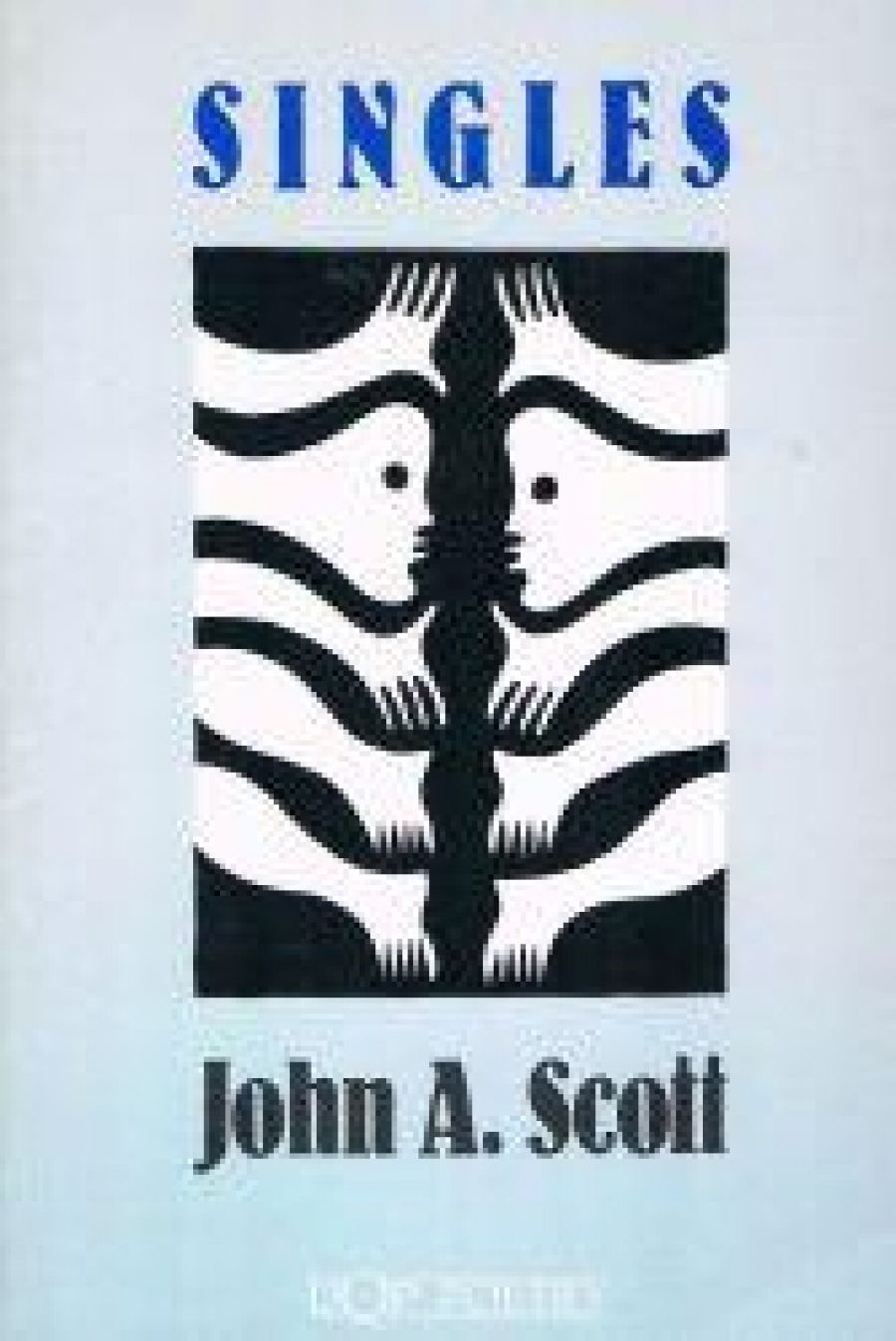
- Free Article: No
- Contents Category: Poetry
- Review Article: Yes
- Online Only: No
- Custom Highlight Text:
This is John A. Scott’s sixth collection of poems since 1975. The volume is slim but not thin. Each poem encompasses its observation, reflection, or moment from which departures are measured, as the positives and negatives of ‘delicious solitude’ are weighed. Amid urban blues, bar-speak, team games and the distorting foci of others’ projections, the ‘predicate adjective alone’ evokes either dignity, pathos, or something in between. Scott considers the prospects.
- Book 1 Title: Singles
- Book 1 Subtitle: Shorter works 1981–1986
- Book 1 Biblio: University of Queensland Press, 53pp, $9.95pb
Scott has a sure sense of appropriateness of form and he shifts register with ease to convey the tonal modulations of savoured or suffered solitude. I enjoyed the epigrammatic precision of this ‘Third Coming’:
Nightfall in Bethlehem
A rough beast thumbing
Through the street directory
and the varied structures of lyrics, sonnets, narrative or prose poems. In a poem like ‘Velocity’ a longer line and repeated verse paragraph ‘lists’ thought processes as a life is reviewed. The interval of the poem charts the distance between past and future, experience and wishful thinking and ignorance and knowledge; this man is unaware that an impending ‘dispersion’ of warmth has already begun:
He looks towards the light of the house contrasting his sense
of life with the absence he momentarily feels in the yard.
In this collection Scott explores separateness but also the integral connections between self, world and word. In the earliest volume, The Barbarous Sitkshow, this was apparent:
These perfect words, like
a bloodrush, reel you to the streets
& Highways, longframes running down
to
Their lives, these strangers.(‘Flooded City’)
This thread was pursued further in my favourite poem from St Clair – one that is included, with a new dedication, in Singles. Here, language is used like a lifeline:
For she has learnt from older men across
the common of her pilgrimage
a clue; a tugging at the figure-eights
of art and their infinities.
A terror of the commonplace that knows
the vast importance of the line.
In ‘Changing Room’, the first poem of the collection, descriptive language serves like a caress that is stopped by the recognition that: ‘She’s leaving; and the similes are gone.’
Throughout, life is imaged in a constant interplay between language and silence, a kind of naming to make life manageable. In the final poem, ‘Catherine’, there is a restoration of the ‘dance’ of language and a further affirmation of this creative:
And so it returns
to the narratives of rain, if only
for the moment of downpour, A speech
described in faint parallels, becoming
this pool, or this flood.
In between, some fine poems: a revitalisation of ‘Propertius II, 26a’ from St Clair, a successful tussle for honesty in ‘She Paints a Room (1984)’ and a rather Larkinesque tribute to partnerships in ‘Bicycles’. There are moments of insistence (those muezzin afternoons) and ponderousness, and perhaps there is more determination than art in locating that well-used epithet in ‘Wine Dark’ – but these are minor irritations. Scott’s sure handling of panoramic narratives, with their political framework and intricately interwoven testimonies, ensured his reputation. I enjoyed the fine focus and quiet elegance of these recent observations:
Now he lies awake,
the closest he will ever be to her
And from the sounds that might
name this place, or give it shape
and sense when all is dark, this is
only her, breathing.


Comments powered by CComment